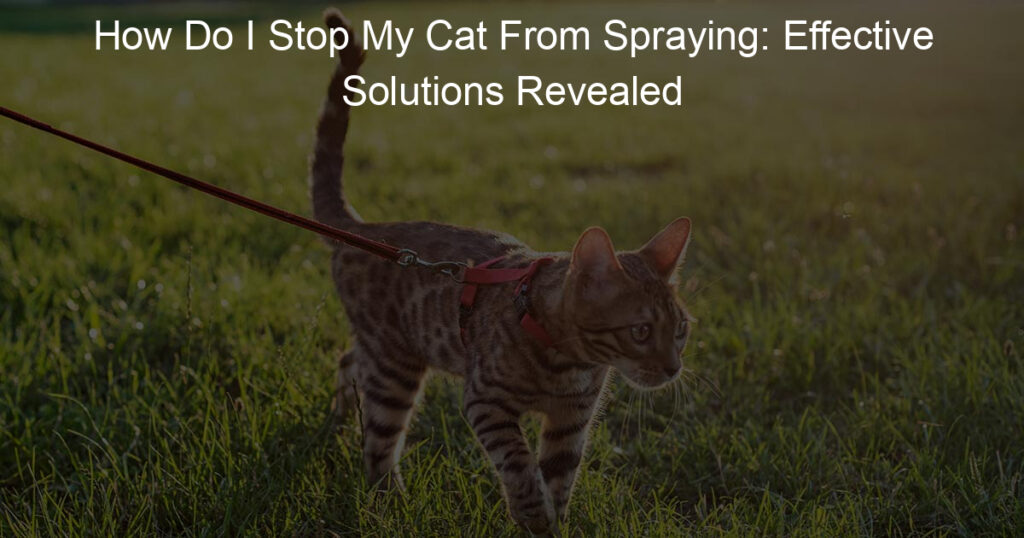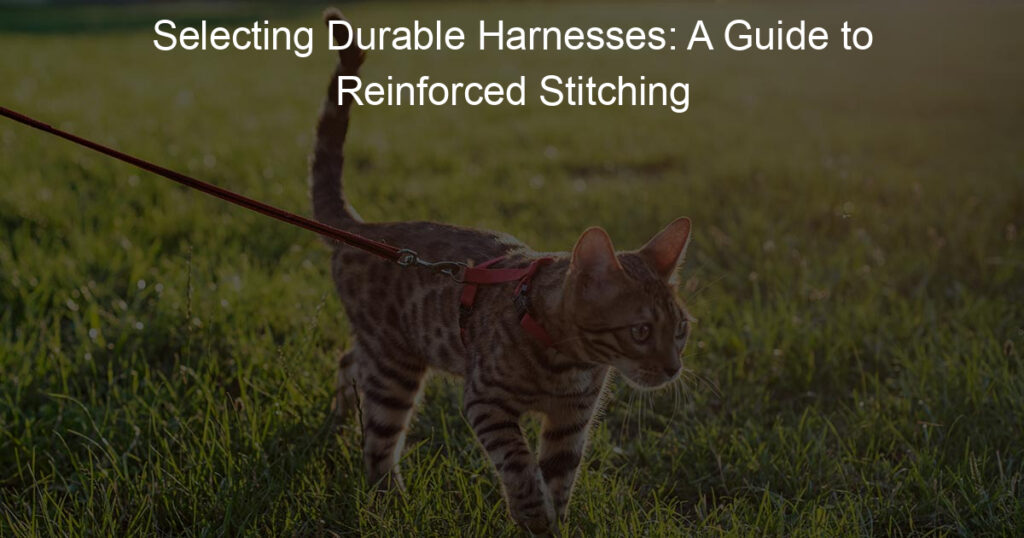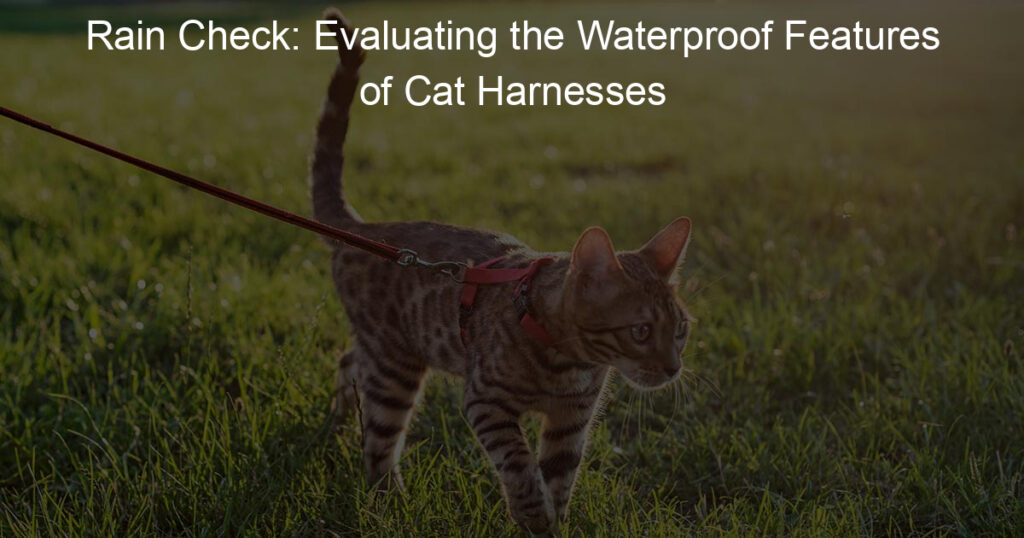As a cat owner, dealing with spraying can be a frustrating experience.
Cats spray to mark their territory and communicate with other cats, but it can result in a strong, unpleasant odor and damage to your home.
Understanding why your cat is spraying and taking steps to address the underlying issues is crucial for stopping this unwanted behavior.
How do I stop my cat from spraying is a question many ask, and there are many factors that can contribute to your cat’s spraying habits, such as medical problems, stress, and the environment.
It’s important to identify the root cause of the behavior and take appropriate preventative measures to put an end to it. Consider having your cat spayed or neutered if they’re not already, as this can significantly reduce spraying.
In addition, pay special attention to what may be causing your feline friend’s stress and take steps to adjust their environment to better suit their needs.
Key Takeaways
- Understand the reasons behind your cat’s spraying and take steps to address the issue
- Consider spaying or neutering your cat to reduce the likelihood of spraying
- Identify and minimize sources of stress in your cat’s environment to discourage spraying behavior
How Do I Stop My Cat From Spraying

As a cat owner, I know that cat spraying can be a frustrating behavior to deal with. Cat spraying is a natural behavior in which cats mark their territory by releasing a small amount of urine on vertical surfaces, such as walls and furniture.
This is different from regular urination, where they squat to release a larger volume of urine on horizontal surfaces.
The first step in dealing with cat spraying is to understand why cats spray. There are several reasons for this behavior, with one of the main reasons being territorial marking.
Cats are territorial creatures, and they use their scent to mark boundaries and communicate with other cats. When they spray, they are essentially leaving a message for other cats, letting them know that the area belongs to them.
Another reason why cat spray is to express stress or anxiety. Changes in the household, such as the introduction of new pets, visitors, or even a change in routine, can cause stress for your cat. Spraying is their way of coping with the stress and trying to feel more secure in their environment.
In addition to territorial marking and stress, medical issues can also be a factor in cat spraying behavior. Urinary tract infections and other medical conditions can cause cats to feel the need to urinate more frequently, and in some cases, this can lead to spraying.
If you suspect that your cat may have a medical issue, it’s important to consult with a veterinarian.
Comprehending cat spraying involves three main aspects: the natural instinct to mark territory, stress or anxiety, and potential medical issues. Once the cause of the spraying is identified, it becomes easier to take appropriate actions to stop the behavior.
Keeping in mind these factors and approaching the situation through a knowledgeable and neutral perspective will ensure the best approach to stopping your cat from spraying.
Preventing Spraying Behaviors
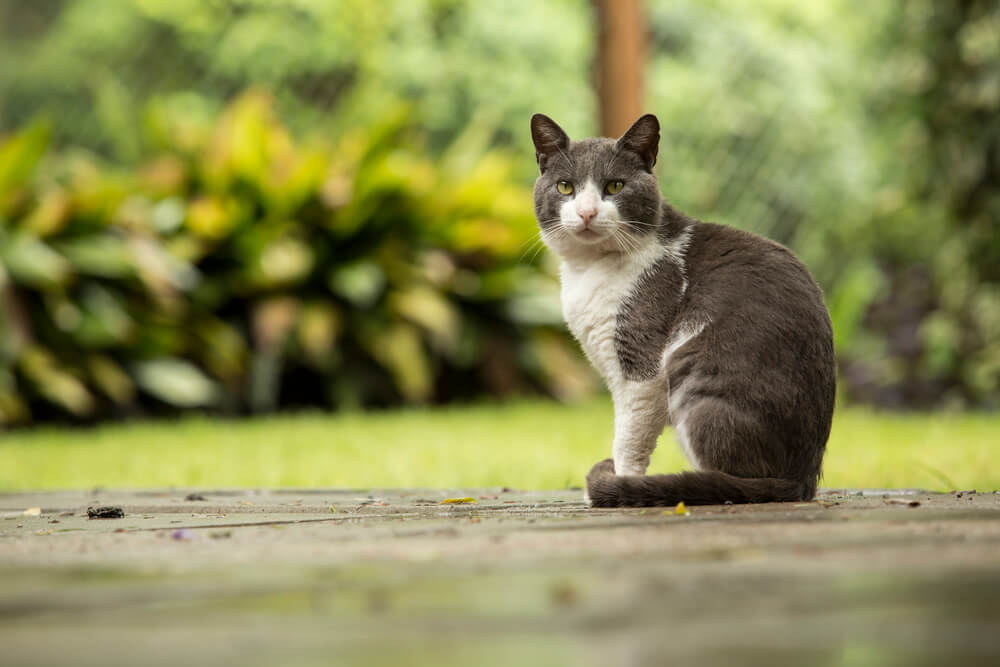
To prevent my cat from spraying, I first ensured that my cat was neutered. Neutering can significantly reduce spraying behaviors, as it decreases their territorial instincts and hormonal urges.
I also pay close attention to the litter box environment. The litter boxes should be kept clean and placed in quiet, low-traffic areas. I have multiple litter boxes, especially if I have more than one cat, to ensure that each cat has its own space.
Additionally, I try to use unscented litter, as strong scents can be off-putting for cats.
To further reduce my cat’s stress levels, I provide plenty of vertical space, such as cat trees and shelves. This allows my cat to have a sense of control over its environment and creates a cozy, secure territory.
Besides, I make sure my cat has places to hide and escape if necessary.
Maintaining a consistent routine is essential when it comes to preventing spraying behaviors. I have a regular schedule for feeding, brushing, and playing with my cat, which helps to create a sense of stability.
Engaging my cat in interactive play sessions every day can help redirect its energy and prevent boredom.
Ultimately, by understanding my cat’s needs and providing a comfortable, low-stress environment, I can significantly decrease the chances of my cat spraying.
Medical Factors Contributing to Spraying
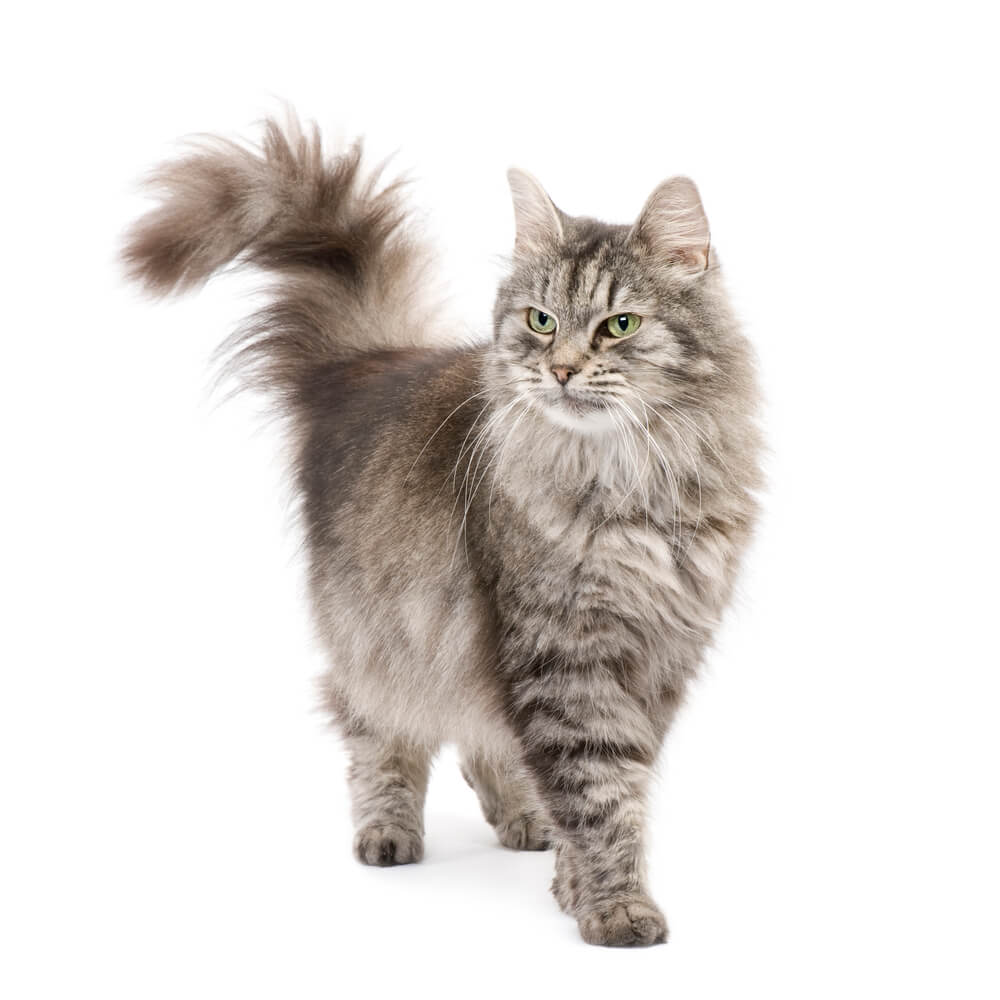
As a cat owner, I know that spraying behavior can be frustrating, but it’s important to understand that there could be medical factors contributing to this issue. Cats may spray for various reasons, and sometimes an underlying health problem is to blame.
In such cases, it’s essential to consult with a veterinarian to rule out or diagnose any medical issues.
Cats can suffer from cystitis, a condition that causes inflammation of the bladder. This can lead to discomfort and frequent, urgent urination, causing them to spray both in their litter box and outside of it.
Cystitis can be triggered by stress, infections, or even hormonal imbalances. If I suspect my cat is experiencing cystitis, I should seek veterinary care to address the root cause and prevent future spraying incidents.
Another medical issue to consider is lower urinary tract disease (LUTD). This umbrella term covers various disorders affecting the urinary tract, including bladder stones and urinary tract infections. These conditions can cause symptoms similar to cystitis, leading to increased or inappropriate urination.
If my cat is diagnosed with LUTD, the veterinarian will likely provide a treatment plan, such as medication, dietary adjustments, or even surgery, depending on the condition.
Urinary tract infections (UTIs) are a common medical problem that can lead to spraying behavior in cats. When bacteria invade the urinary tract, it can cause pain and discomfort, leading cats to seek relief by urinating. This may result in frequent spraying to alleviate their symptoms.
If I suspect my cat has a UTI, I should work with a veterinarian to obtain an accurate diagnosis and appropriate treatment.
In conclusion, it’s crucial to recognize that my cat’s spraying behaviors might be linked to medical factors such as cystitis, lower urinary tract disease, or urinary tract infections.
Seeking help from a veterinarian is essential for determining the best course of action and ensuring my cat’s health is in good hands.
Stress Related Spraying
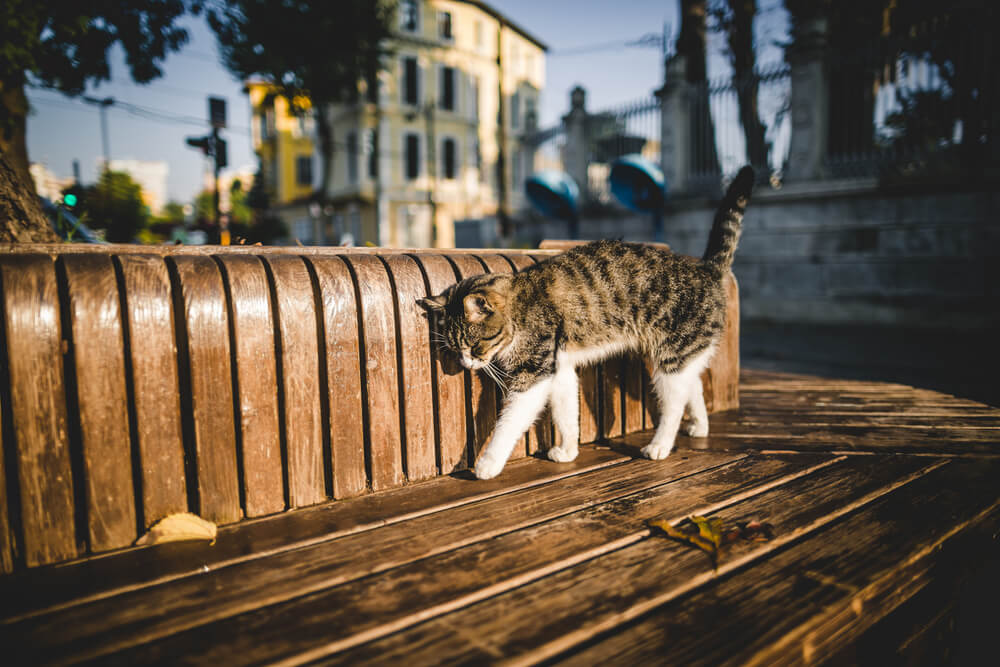
In my experience with cats, stress is often a significant factor contributing to their spraying behavior. When cats feel anxious, they may spray to mark their territory or signal their discomfort.
It is essential to identify the stressors affecting the cat in order to address and minimize their spraying.
One common cause of stress in cats is the introduction of new pets into their environment. This change can create a sense of competition or threat to their territory, leading to anxiety and spraying.
To help alleviate this stress, I gradually introduced the new pet, giving my cat time to adjust and establish their relationship.
Another cause of stress for cats is living in a multi-cat household. Cats may experience anxiety due to sharing resources or having too little personal space.
To help reduce this tension, I make sure to provide each cat with their own feeding area, litter box, and sleeping space. Also, regular playtime and interaction with each cat can foster positive relationships among them.
When remodeling or rearranging my home, I understand it can be stressful for my cat, as they are sensitive to changes in their environment.
To make this process easier, I try to maintain a sense of routine and familiarity by keeping their belongings, such as bedding and toys, in their usual places as much as possible.
If stress-related spraying becomes a persistent issue, I may consider discussing anxiety medications or anti-anxiety medications with my veterinarian. These can help alleviate the cat’s stress, resulting in decreased spraying behavior.
Nevertheless, I would explore this option after trying other, more natural methods to address the issue.
Taking time to understand and address the factors causing stress in my cat’s life is crucial in preventing anxiety-related spraying.
By creating a supportive and stable environment, I can help them feel relaxed and content, significantly reducing spraying incidents.
Spay/Neuter and Spraying
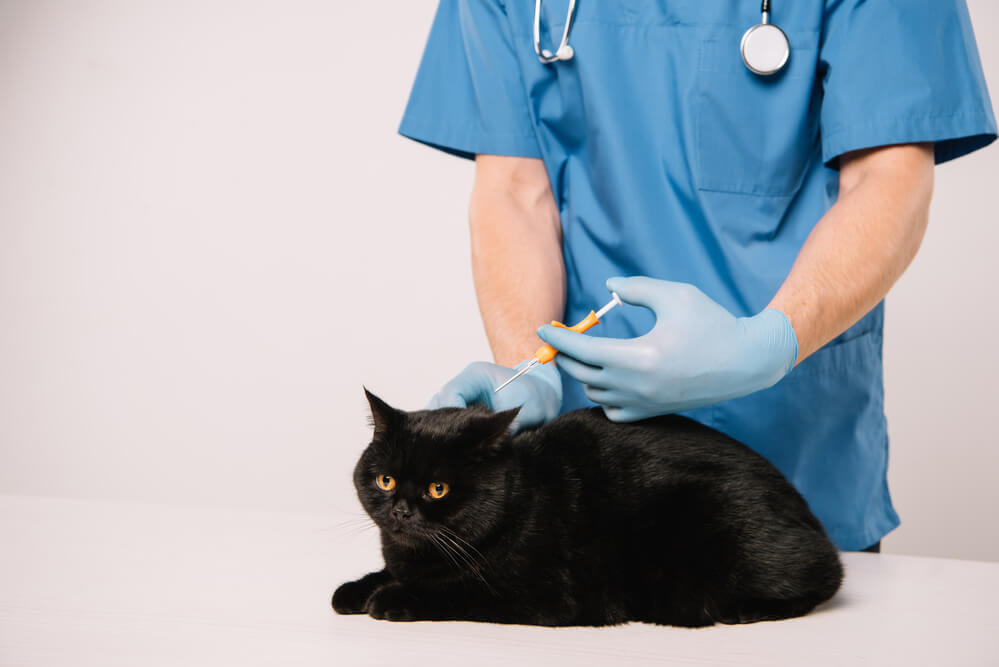
In my experience, one of the most effective ways to stop a cat from spraying is to have them spayed or neutered. Spaying and neutering are surgical procedures that render cats sterile and, as a result, can significantly reduce their mating behavior.
Intact cats, those that have not been spayed or neutered, are more likely to display marking behaviors like spraying.
As a cat owner, it’s essential to be aware of when your cat reaches sexual maturity. Cats typically reach sexual maturity around six months of age, although it can vary depending on the breed.
Once they hit this age, their hormones may trigger the urge to spray as a means of attracting a mate or marking territory.
Spaying or neutering your cat before they reaches sexual maturity can help prevent the development of spraying behavior. By doing so, you are effectively eliminating the hormonal urges that drive your cat to spray.
Spayed or neutered cats are also less likely to display other unwanted mating behaviors, such as roaming, yowling, and fighting with other cats.
In addition to the behavioral benefits, spaying and neutering also have health benefits for your cat, including reducing the risk of certain reproductive cancers.
Remember, it’s never too late to spay or neuter your cat. While it is ideal to have the procedure done before sexual maturity, adult cats can also benefit from being spayed or neutered.
If your cat has already begun spraying, it might take a few weeks or even months for the behavior to subside entirely, but be patient and give it time.
Spaying and neutering are highly effective methods for reducing or eliminating spraying behavior in cats. They can also prevent other unwanted mating behaviors and provide health benefits.
It’s crucial to get your cat spayed or neutered before they reach sexual maturity, although adult cats can still benefit from the procedure.
Behavioral Causes of Spraying
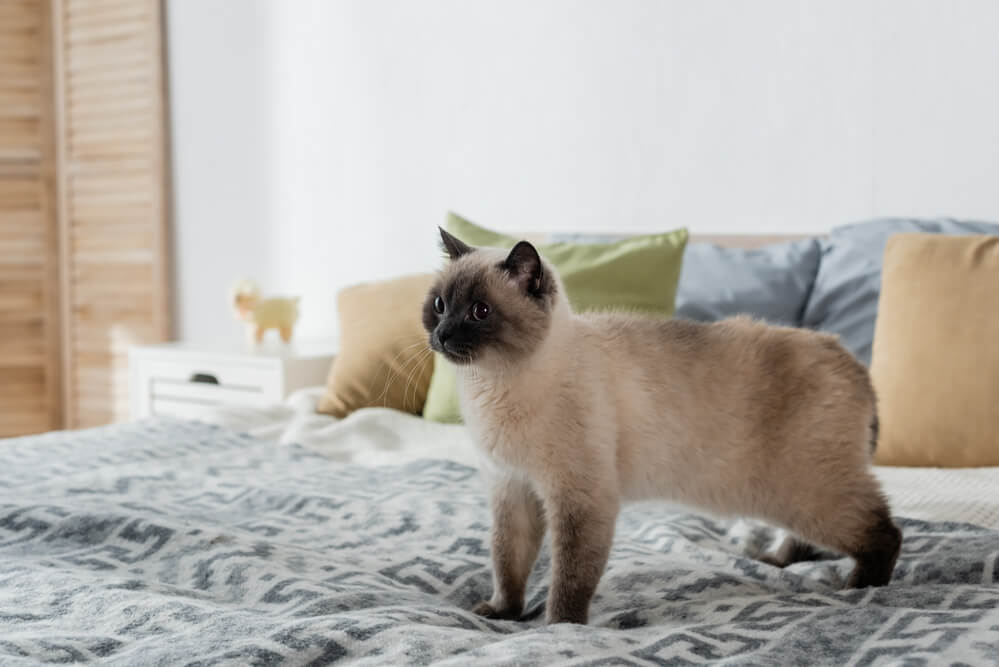
I have observed and learned that spraying is a behavior often triggered by various factors, and understanding these causes can help me tackle the issue effectively.
One major reason behind spraying is territorial marking. Cats are territorial creatures, and in their world, scent plays a crucial role in establishing dominance or ownership over a particular territory.
When my cat encounters another cat in the neighborhood or feels its space is being invaded, it may resort to spraying to mark its territory and send a clear message to potential intruders.
Vertical surfaces, such as furniture or walls, are preferred spots for this form of scent marking.
Spraying can also be a form of communication between felines. Through the scent, my cat can convey various messages to other cats, such as its reproductive status or simply letting others know about its presence.
This form of communication does not always involve aggression but is simply a way of exchanging information.
In some cases, spraying can also result from behavioral issues or stress. If my cat is experiencing anxiety or fear due to a change in its environment, such as a new family member or moving to a new home, it may resort to spraying to cope with these emotions.
Identifying the root cause of stress and working on addressing it is essential in these situations.
I’ve found that body language also plays a significant role in understanding why my cat could be spraying. Monitoring its posture, ear positions, and tail movements can provide valuable insights into the underlying reasons behind this behavior.
Observing how it interacts with other cats or animals in the environment can also give me a better understanding of any triggers causing spraying.
By gaining a deeper understanding of the behavioral causes behind spraying, I can develop targeted solutions that can help address this issue and create a harmonious and stress-free environment for my cat.
Environmental Factors Influencing Spraying
In my experience, there are several environmental factors that can influence a cat’s spraying behavior, particularly in a multi-cat household. Managing these factors can help reduce the instances of spraying in your home.
Firstly, a common issue for indoor cats is the lack of independent space. Cats are territorial animals and require their own space to feel comfortable. Providing each cat with separate areas for playing, sleeping, and eating can help alleviate stress and minimize the need for marking territory through spraying.
Living in a neighborhood with outdoor cats can also impact an indoor cat’s behavior. If your cat sees another cat through windows, this can provoke a territorial response, leading to spraying.
To address this issue, I limit my cat’s view of outdoor cats by covering certain windows or moving furniture so they cannot see outdoors easily.
In addition, in multi-cat households, it’s essential to have enough litter boxes for all cats. My rule of thumb is to provide one more litter box than the number of cats, which helps minimize territorial disputes and reduce spraying incidents.
It’s also important to clean the litter boxes regularly, as a dirty litter box can trigger spraying.
Environmental enrichment is another essential factor that must be taken into consideration. I keep my indoor cat entertained with a variety of toys, scratching posts, and perches to reduce stress and curb the need for marking territory.
Providing engaging activities and mental stimulation can decrease spraying incidents significantly.
Lastly, the presence of neighborhood cats roaming near my home can affect my indoor cat’s territorial behavior. One solution I’ve found is to discourage these outdoor cats from approaching my property by using motion-sensor sprinklers or ultrasonic devices.
This helps make the outdoor environment less inviting for them and ultimately helps my indoor cat feel more secure, reducing the need to spray.
Identifying and Addressing Spraying Triggers
As a pet owner, I understand that identifying and addressing the triggers of cat spraying is crucial in helping our feline friends stop this unwanted behavior. Cat spraying, also known as urine marking, involves a cat depositing a small amount of urine on a vertical surface.
This behavior is different from regular urination, which occurs on a horizontal surface like in a litter box.
I’ve noticed that fear and environmental factors can serve as common triggers for spraying. Changes to their territory or the introduction of new animals or people can make cats feel uneasy.
To ease their fear in these situations, I suggest offering a sanctuary room, providing ample hiding places, and incorporating comforting scents, like Feliway or catnip.
Additionally, I’ve observed that conflicts between cats can significantly contribute to spraying. If there are multiple cats in the house, it is essential to keep their resources separate to minimize territorial disputes.
I recommend placing food bowls, water dishes, and litter boxes in different areas of the house so that no single cat feels threatened or monopolizes the resources.
To further prevent spraying, I’ve found keeping a regular routine plays a significant role in promoting a sense of security for my cats.
Consistency in their daily schedule, especially around feeding times, helps reduce anxiety and, in turn, discourages urine marking.
Cleaning and Managing Sprayed Areas
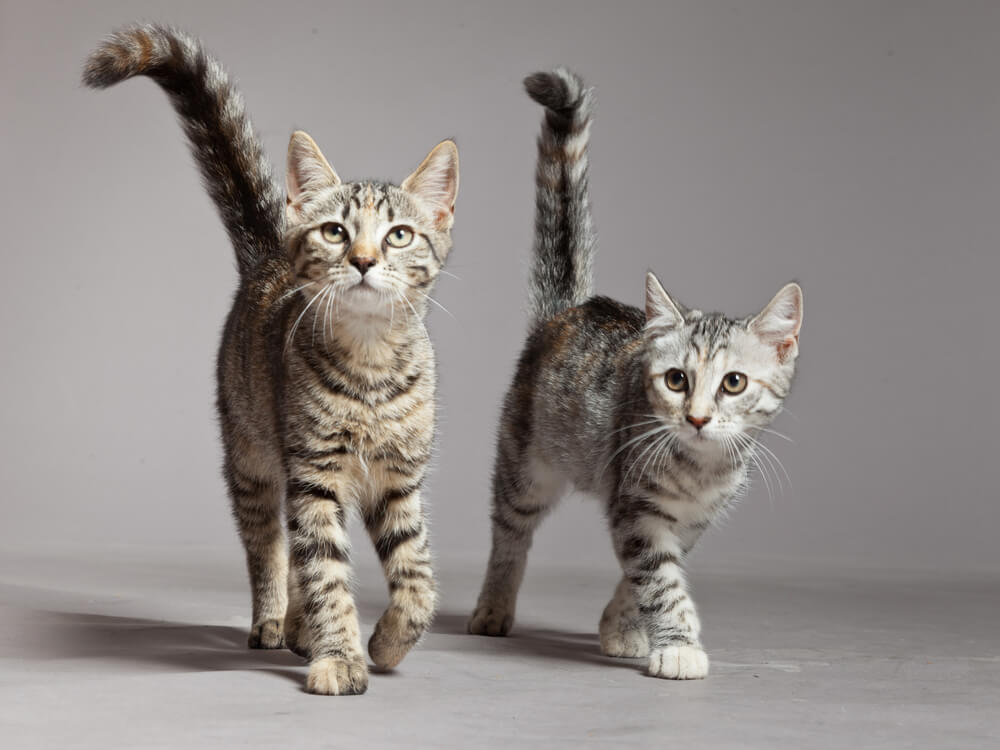
When my cat sprays, I find it essential to clean and manage the sprayed areas to discourage future marking. My first step, of course, is to remove any trace of cat urine.
To accomplish this, I use an enzymatic cleaner specifically designed for dealing with pet stains.
Enzymatic cleaners are important because they break down the urine molecules, effectively eliminating the scent. This is crucial, as cats can detect the smell of their own urine even after it’s been cleaned with normal household cleaners.
Regular cleaning just isn’t enough to deter my cat from urinating in the same spot again.
In addition to using enzymatic cleaners, I discovered the usefulness of synthetic pheromone sprays. These sprays are designed to mimic the natural pheromones that cats release when they feel safe and comfortable in their environment.
By applying a pheromone spray to the areas my cat has previously marked, I help create a calming environment that discourages them from urinating or spraying there again.
Moreover, cleaning affected areas outside my home is equally as important. If my cat has been spraying on an exterior wall or fence, for example, I don’t hesitate to give it a thorough cleaning.
It’s necessary to remember that the scent of cat urine can linger outdoors as well and can compel my cat (or others) to return to the same spot to mark their territory.
Managing previously sprayed areas also involves making changes to my cat’s environment. I’ve found that rearranging furniture or placing obstacles (e.g., temporary barriers or double-sided tape) in problematic areas can be effective in deterring future marking.
This is particularly helpful for removing visual cues and breaking patterns so my cat is less likely to return to the same spot.
Diligently using enzymatic cleaners, synthetic pheromone sprays, and modifying my cat’s environment, I’ve found great success in managing and preventing future spraying.
It’s essential to always remain proactive in order to help my cat feel more comfortable and secure in our home, which in turn reduces their need to mark frequently.
Conclusion
As a cat parent, I understand the challenges that come with trying to stop a cat from spraying. While it can be a frustrating experience, it’s important to approach the situation with patience and understanding.
After all, our feline friends may spray for several reasons, including marking their territory or expressing anxiety.
To effectively put an end to this behavior, I recommend following some key steps. First, pay close attention to your cat’s environment to ensure they feel secure and comfortable. A stable and loving home can help reduce anxiety, which is often a major trigger for spraying.
Make sure you’re providing plenty of opportunities for play and interaction, as well as snug spots to rest in.
Moreover, don’t forget the importance of cleanliness! Regularly clean litter boxes and any areas where your cat has sprayed with a proper enzymatic cleaner.
This not only removes the odor but also breaks down the scent molecules, which might invite repeat infractions.
If the spraying persists, it may be time to consult with your veterinarian or a feline behavior specialist. They can help determine if underlying health issues or more complicated behavioral problems may be the cause.
Remember, as cat owners, we must stay confident, knowledgeable, and patient when dealing with challenges like this.
Stopping a cat from spraying might not happen overnight, but with a clear, neutral approach and commitment to understanding and meeting our cat’s needs, we will be well on our way to a harmonious, spray-free household.
Frequently Asked Questions
How to prevent female cats from spraying?
To prevent female cats from spraying, I ensure my cat is spayed in a timely manner. Providing a stress-free environment and identifying any stressors can help reduce her urge to spray.
I also keep her litter boxes clean and give her proper attention to ensure she feels secure in her environment.
What causes a neutered cat to spray?
A neutered cat might spray due to stress, territorial disputes, or medical issues. I ensure my cat’s environment is stable, and I keep any changes to a minimum.
I also check for any signs of medical issues that could cause him discomfort and consult my veterinarian if I suspect a problem.
How to deter cats from marking territory?
To deter cats from marking territory, I make sure to provide multiple litter boxes in different areas of my home. Redirecting my cat’s attention by scheduling play sessions and providing stimulating toys can also discourage territorial marking.
If needed, I consider using pheromone sprays or diffusers to calm my cat and reduce stress.
How to clean up cat spray effectively?
When cleaning up cat spray, I use an enzyme-based cleaner to break down the proteins in the spray. I follow the instructions on the cleaner and apply it to the soiled area, then allow the cleaner to air-dry.
In addition to the cleaner, I also thoroughly wash any fabrics or items exposed to the spray to eliminate lingering odors.
What are the signs of a cat spraying?
Signs of a cat spraying include a strong ammonia-like smell in the house, damp spots on walls or furniture, and my cat conspicuously backing up to a vertical surface while raising her tail.
I may also notice her treading with her back feet and quivering her tail as she’s about to spray.
How frequently do male cats spray?
How frequently a male cat sprays can vary depending on factors like stress and territorial disputes. If my male cat is neutered and in a secure environment, he is less likely to spray often.
Yet, if he feels threatened or stressed, the frequency may increase. Keeping an eye on his behavior and ensuring he is healthy and content can help minimize spraying.

